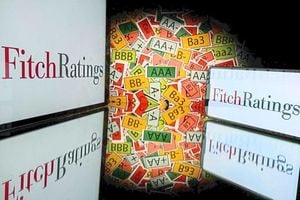Concerns are heightening over China's advancements in artificial intelligence, particularly through DeepSeek, as its access to Nvidia chips raises alarms about potential shifts in technology leadership.
Alexandr Wang, the CEO of Scale AI, made headlines last week when he emphasized the significant role Nvidia's H100 GPUs play in supporting China's rapid progress. Speaking at the World Economic Forum held recently in Davos, Wang highlighted DeepSeek's release of innovative AI models during the Christmas holiday—a strategic move he noted underscored their growing prominence.
This development ignites the debate on whether the United States can maintain its technological superiority amid fierce competition from China. Wang described the situation as akin to an "AI war," asserting, "We need to release U.S. energy to enable this AI boom," indicating urgent investment and innovation must occur to keep pace.
Wang also claimed, remarkably, DeepSeek is reportedly equipped with about 50,000 H100 GPUs, which raises eyebrows considering U.S. export controls intended to limit China's access to advanced technology. According to him, this access has significantly boosted the capabilities of Chinese AI models, enabling them to compete with—and even exceed—those developed by U.S. firms.
The uproar surrounding this topic grew as Elon Musk, CEO of Tesla, echoed Wang's sentiments, reinforcing the notion of DeepSeek's chip advantages. Musk responded affirmatively to reports about DeepSeek's chip count, stating, "Obviously," indicating consensus about the gravity of the situation. Musk's remarks come at a time when Wall Street is increasingly jittery about the impact of Chinese AI advancements on major U.S. tech companies.
Reports indicate the stock market's reaction has been palpable, as leading firms like Nvidia, Microsoft, and Meta faced considerable losses, collectively amounting to $1 trillion. Notably, Nvidia itself saw its shares tumble by 13%, eroding approximately $465 billion from its market cap. Investors remain cautious, and worries about the U.S. tech sector's future resilience against international competition loom large.
At the crux of this discussion is DeepSeek's impressive track record, having recently launched its AI Assistant powered by their V3 model, which reportedly outperformed ChatGPT to become the top-grossing free app on the Apple App Store. This feat solidifies the notion of China's growing influence in the AI space and leaves observers questioning future trajectories of AI innovation.
Wang's comments reflect significant underlying tensions, where he recognizes both the strengths of the U.S. AI capability historically and the need for urgent revitalization. He remarked, "The reality is yes and no," alluding to the dual-competitive nature already evident and potentially detrimental without substantial responses.
Many experts point out the possibility of additional challenges arising from regulatory frameworks and export controls on advanced technologies. Even though the U.S. has taken steps to safeguard its technological edge, the efficacy of these controls remains uncertain. Wang warned, "they are going to be limited by the chip controls and the export controls," acknowledging DeepSeek's ability to acquire other specialized hardware remains restricted.
Another key figure, Salesforce's CEO Marc Benioff, indicated the true value of AI does not solely derive from cutting-edge chipsets or financial backing but instead stems from data and metadata—"the oxygen fueling AI's potential," he argued. Such perspectives highlight the tension between hardware access and innovative application of existing resources, paving the way for more nuanced discussions about AI development.
Benioff's assertions reinforced the dismantling of traditional notions surrounding AI superiority based on resources alone, as he proposed, "The future's fortune? It's in our data." This notion could suggest avenues for U.S. firms to innovate beyond raw technical capabilities by focusing more on data strategies.
It's clear the interplay between advanced AI technologies and competitive frameworks is continuously changing. The latest revelations about DeepSeek's capabilities sharply inquire whether the United States is prepared for this technological paradigm shift or whether it will remain preoccupied with its traditional dominance.
Regardless, the conversation surrounding AI technology, chip access, and international competition is only likely to intensify as DeepSeek continues to challenge established paradigms. If it manages to sustain or even broaden its lead, the ramifications for the tech industry, economy, and bilateral relationships between the U.S. and China could be immense.
Expectations for the generative AI market project it will value around $1 trillion over the next decade. With such large stakes, how countries approach investments, controls, and partnerships moving forward carries significant weight for the future—highlighting the urgent need for both nations to innovate and collaborate or risk being left behind.



